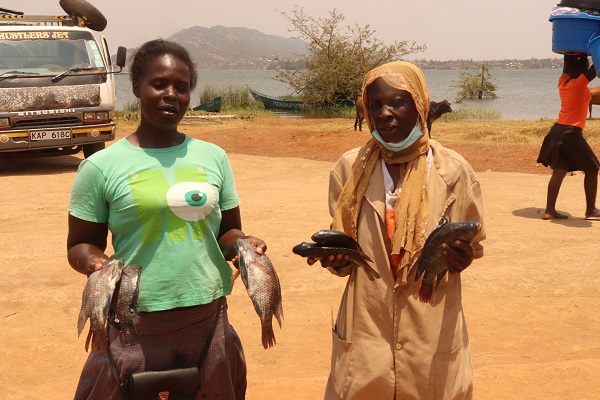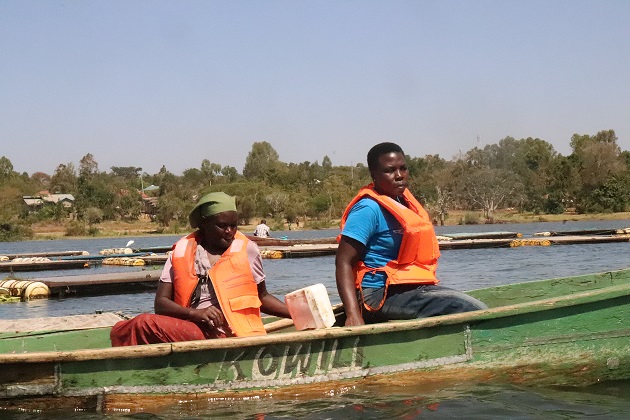
By Robert Malala, Busia County I malalarobert@gmail.com
Western region of Kenya has been one of the main supply of fish to Kenyan market for ages and one of the major sources of income to the residents of counties bordering Lake Victoria.
However, women who are the most participants in the trade of these commodity have found themselves in a trap of exchanging their bodies sexually with the fishermen so as to get the business going on, popularly known as Fish for sex ‘jaboya’.
This situation has been feared to be a major contributor to the spread of HIV/AIDS that has seen the region leading in the national HIV/AIDS prevalence.
“HIV/AIDS began many years ago and it is rampant in this area because of a practice we call jaboya,” revealed Mrs Judith Abong’o, Rangwe sub-county HIV/AIDS Control Coordinator, Homa Bay County, western Kenya.
“We have fishermen who demand for sex from women who want to purchase fish from them, she added.
According to 2022 HIV/AIDS prevalence national statistics released by the National AID and STI Control program NASCOP, Western Counties Bordering Lake Victoria took the first five position on the list with Homabay having 19.6 percent, Kisumu 17.5, Siaya 15.3, Migori 13.3 and Busia 7.7 consecutively.
These figures surpassed the national percentage in the prevalence which is at 4.8 percent with women leading by 5.2 percent compared to men who are at 4.5 percent.
However, the introduction of fish cage farming technology in the lake region counties might bring this threat to an end.
Other than this technology bringing a solution towards fish for sex in the region it has broken the tradition of fishing being an activity only for men, and brought women to the forefront in the industry.
Traditional fishing was too heavy duty for women, and there were lots of risks including attacks from dangerous aquatic creatures, and fear of being arrested and tortured by the Ugandan Defense Force officers that disadvantaged the women.
Kisumu County Executive Committee (CEC) member in charge of Agriculture, Irrigation and Fisheries department Kenneth Anyango, termed the fish cage idea as a reliable gender-inclusive option for the economic income to residents.
‘’In Kisumu county, twenty percent of women have gone to fish caging. The old lake fishing method was biased against women and mostly done by men but as long as you have capital, you can easily set up your cage,” said Anyango.
Francesca Odhiambo, a fish trader at Dunga beach in Kisumu County for the last twenty years and secretary of Chiela Smart Women Group, confidently testifies how they got into fish cage farming as a group, a move that has totally changed their lives economically.

“Definitely, there is a significant change in our income, like now we have our own cage and we are sure of getting any quantity of fish that our clients may require,” said Odhiambo.
“I am happy that this idea has given us opportunity to have our own fish, instead of getting involved in fish for sex activities that are common around this beach,” she added.
Fish cage technology was introduced in 2013 as a pilot project at Dunga Beach in Kisumu County by Kenya Marine and Fisheries Research Institute (KEMFRI) and Egerton University.
Later, the County government of Kisumu adopted the practice before it spread to other lake region counties.
A vibrant Kowil Women Group that consists of twenty members has also invested in this new technology. The group is located at Nyenye Got Agulu Beach on the shores of Lake Victoria, about ninety five kilometres away from Dunga, in Bondo sub-county in Siaya County.
“We began fish cage farming in 2018 and the difference is that you are sure of the quantity of fish at hand and an estimate of the money you will get after harvesting,” said Evelyne Akello, one of the members of Kowil Women Group.
According to the acting director of fisheries in the county government of Siaya, Emman Otieno, women are naturally more committed than men in carrying out tasks.
Otieno reiterated that this is an added advantage to women because it enables them receive funding from the government and other financial institutions to expand their business, and to that effect they have a better chance of doing well in fish cage farming.
“This year the government of Siaya budgeted for substantial amount of money to assist farmers procure feeds because this is the main problem when it comes to aquaculture,” said Otieno.
In Busia County the national government through the Ministry of Mining and Blue Economy is constructing a modern fish landing centre at Mulukoba Beach in Budalang’I Sub-county to a tune of Ksh 124 million Kenya shillings (USD 891,000) that will help in value addition.
Mulukoba Beach has about 150 cages of which 30 percent of the owners are women who are mostly in self-help groups.
62 years old Pascalia Were is one the fish cage farmers at Mulukoba beach, who adopted this new idea a year ago under the umbrella of Mulukoba Women Fish Mongers.
According to her, the technology has numerous advantages compared to traditional fishing methods.
“This technology has made our work easier, we don’t need to waste time chasing for fishermen and other engagements to obtain fish but instead we just harvest and sell,” explained Pascalia were.
Through these aquaculture technology, it is obvious that women can play a major role in diversification of fishing especially during this tough times of climate change if introduced to modern innovations.








